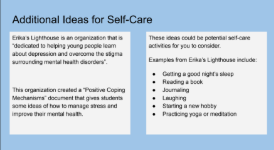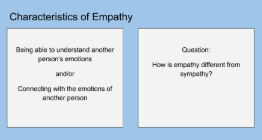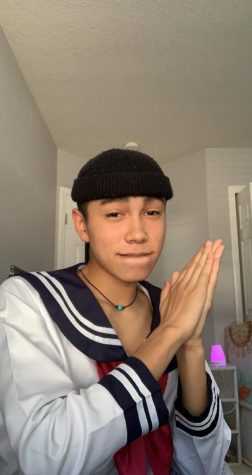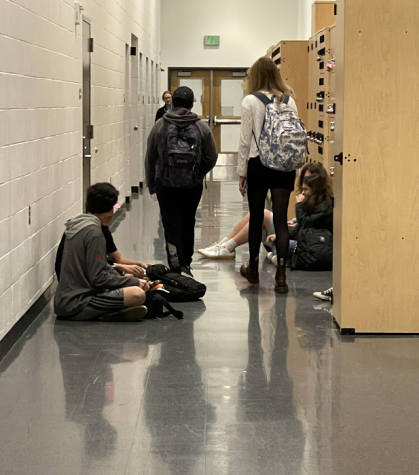Depression 101
Because the Education System Doesn’t Get it.
In early October of 2020, the suicide of a young Aloha student coincided with a district-wide mental health unit, the following week. While it was a nice effort and it is clear there was a good intention, the product was a lackluster reaction that made it seem as though the Beaverton School District and Mountainside High School put very minimal thought into the education of mental health.
One of the big issues with the unit was the approach. The Monday slideshow, focusing on “Self-Care” and “Self-Care  Plans,” showed a superficial understanding of the topic it was addressing. During the presentation, they mentioned, “talking with a friend” or “watching a movie,” and asked students to share some of their own self-care techniques. While this was a good effort, it gives the inaccurate impression – to those who aren’t struggling with these issues – that people simply have the ability to walk it off. This is the wrong message to be telling people, especially those who might be a part of an at-risk individual’s support group. Telling depressed individuals – as well as their friends – that they have the capacity to shake off any affliction, with ease, just by “hanging out with friends” is more commanding than it is informative. In actuality, these activities may be the hardest – and most draining – part of the day for depressed individuals.
Plans,” showed a superficial understanding of the topic it was addressing. During the presentation, they mentioned, “talking with a friend” or “watching a movie,” and asked students to share some of their own self-care techniques. While this was a good effort, it gives the inaccurate impression – to those who aren’t struggling with these issues – that people simply have the ability to walk it off. This is the wrong message to be telling people, especially those who might be a part of an at-risk individual’s support group. Telling depressed individuals – as well as their friends – that they have the capacity to shake off any affliction, with ease, just by “hanging out with friends” is more commanding than it is informative. In actuality, these activities may be the hardest – and most draining – part of the day for depressed individuals.
Day two focused around “Empathy,” and the idea that showing your peers that you understand what they are going  through would help with their situation. Once again, it had good intentions, but it completely missed its mark. The problem with empathy is that to be able to understand someone else’s feelings, you first have to share or experience those feelings. Absolute empathy cannot come before an individual can understand another person’s state of mind, beyond what a slideshow has told them. Unfortunately, for many, a true understanding of what has led to their condition is not something they can easily share with others – whether they want to or not. It becomes difficult for those without mental health issues to understand what a depressed person is going through when they don’t have much insight, themselves, so just claiming they understand doesn’t actually help anyone and could potentially make things worse.
through would help with their situation. Once again, it had good intentions, but it completely missed its mark. The problem with empathy is that to be able to understand someone else’s feelings, you first have to share or experience those feelings. Absolute empathy cannot come before an individual can understand another person’s state of mind, beyond what a slideshow has told them. Unfortunately, for many, a true understanding of what has led to their condition is not something they can easily share with others – whether they want to or not. It becomes difficult for those without mental health issues to understand what a depressed person is going through when they don’t have much insight, themselves, so just claiming they understand doesn’t actually help anyone and could potentially make things worse.

The final slideshow was centered around stigma. The main focus of this interactive slideshow was a myth-vs.-fact section, where the BSD tried to discredit myths, and bring light to facts about depression. Similar to the previous presentations, a lack of attention-to-detail – as well as a general lack of understanding – resulted in an unsatisfactory lesson plan that ultimately taught us nothing. Within these myth-vs.-fact slides, you can find incredibly conspicuous cases of the district misunderstanding the material they claim to be educating us on.

For example, it stated that teens who talked about their issues were only opening up because they wanted attention. It seemed as though the message, that was intended to be told, was that teens who speak freely about their issues, are seeking help and need someone to pay attention to them; however, the point that actually came across was that these depressed teens were seeking attention, rather than a true confidant. This, again, paints depression in the wrong light. It only helps to reinforce the previous misunderstandings that may be held by those who don’t suffer from the same issues. Meaning, the lesson only perpetuates the stigma it attempts to “discredit.” Ironic, isn’t it?
The point of this article was to connect with every student and to educate them on an issue that was deemed important/relevant enough to justify a district-wide lesson. However, not every student had access to this education. With the new distance learning schedule, not every student is currently enrolled in advisory first semester. This means that many students have gone without the issue even being brought to their attention. When this concern was brought to Principal Corsetti, he shed some light on Mountainside’s plan to address the issue.
“The plan is for Advisory classes during 2nd semester to also have the suicide-prevention and mental health wellness lessons taught during their Advisory classes second semester. It is important that all students know the resources available at school and in the community to support their mental health.”
Even so, the issue still remains that students who had advisory first semester do not feel adequately educated on the issue. When asked about their opinions on the effectiveness of the Seniors at Mountainside offered insight, as well as criticism, on the experience:
“I wouldn’t have even considered it a unit on mental health.” – Katherine Whitcomb
“I found the lessons a little bit mundane. Mental health is important but the advisory teachers didn’t seem engaged. The students seemed, even less so. Perhaps finding a different way to advocate for people with mental health would be more beneficial for everyone.” – Kylie Joerg
For future reference, if the intention is suicide-prevention, the lesson plans should present themselves as more well-thought-out, especially when dealing with such a sensitive issue. Presenting this topic needs to be by people who are prepared to do so. If teachers are not comfortable educating suicide prevention, because this is such a heavy subject, trained professionals need to come in. Lack of enthusiasm can create the stigma trying to be dissolved because the unit just comes across as a burden to be taught which can degrade the importance. Not to mention that not everyone gets the unit at the same time. There is no guarantee knowing what student is suffering so this needs to be brought to everyone and understood.
This is something not everyone understands, and if you are going to take on the responsibility of educating people, please do it justice.
Your donation will support the student journalists of Mountainside High School. Your contribution will allow us to purchase equipment and cover our annual website hosting costs.

Lillith Waters is a senior at Mountainside High School and is working in the Op-Ed department. She chose journalism because she is interested in putting...

Joaquin Plascencia Mundell is a senior and a writer in the Op-Ed department of The Peak. When not in school, he enjoys skating and drawing. If there were...







